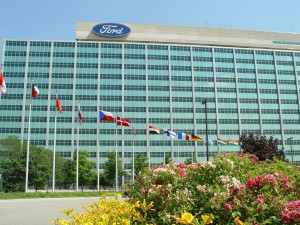According to a newly filed lawsuit against Ford, the automaker “boosted” the technology used in newer versions of its famed EcoBoost engines from a trio of professors from the Massachusetts Institute of Technology.
Ford introduced EcoBoost to the world in 2009, suggesting the turbocharger-based system would allow smaller engines to provide big power while retaining their ability to use less gas. While the public initially played wait-and-see with the technology, it’s now spread across Ford’s engine offerings like ivy on a brick building.
The automaker and university have a long history together, and the lawsuit suggests Ford may have taken advantage of that relationship. The MIT professors claim the Dearborn, Michigan-based automaker is using its dual port- and direct-injection technology without permission for its EcoBoost and 5.0-liter V8 engines produced in recent years.
The three professors, Leslie Bromberg, Daniel R. Cohn, and John B. Heywood, worked on technology surrounding internal combustion engines, and claim to have invented the dual-injection system.
(Ford adding hybrid, high-performance models to Explorer line-up. Click Here for the story.)
Naturally they formed a company, Ethanol Boosting Systems LLC, and offered to license five patents to Ford in 2014, according to the lawsuit, but negotiations broke down and Ford declined to license the patents. However, the company was already incorporating the technology into future editions of the engines.
Though Ford denied using the technology, the professors point to a press release Ford issued less than two years later for its 2018 F-150 that boasted of “advanced dual port and direct-injection technology.”
(Click Here for more about the new Explorer.)
It was used on 3.5-liter EcoBoost engines and other engines that are available in the F-150, Expedition and other vehicles.
The feature was on the 3.5-liter EcoBoost V6, which, Ford said, “adds dual port and direct-injection technology to deliver more power and torque than the previous 3.5-liter V6, plus improved projected EPA-estimated gas mileage — a win-win for customers.” The 2.7-liter EcoBoost V6 and the 5.0-liter V8 also received the technology for 2018.
(To see more about the new Ford Edge ST, Click Here.)
The lawsuit seeks unspecified damages. Neither Ford nor MIT officials will comment on the lawsuit.



This article has a number of problems: 1.There is (never has been) a 3.3L EcoBoost engine; 2. Dual injection is only a PART of EcoBoost (it is not EcoBoost entirely); 3. It implies that EcoBoost technology has been used on the 5.0 V8 (EcoBoost technology has never been used on that engine).
Soakee: You raise a number of points here so I’ll take them as you’ve laid them out. 1. You are correct. In my rush to get this out quickly, I hit the wrong button. I try to re-read the stories shortly after I post them and realized I’d accidentally created a new, albeit non-existent, engine and corrected it. 2. I think it’s clear in the story that dual injection is just part of EcoBoost. It’s referenced in three different places that it’s part of EcoBoost. 3. I think you’re inferring this because I’m definitely not implying this in the story, as evidenced by this sentence: “The MIT professors claim the Dearborn, Michigan-based automaker is using its dual port- and direct-injection technology without permission for its EcoBoost and 5.0-liter V8 engines produced in recent years.” That said, I do appreciate you reading so carefully and closely and making sure we’re on the mark. MAS